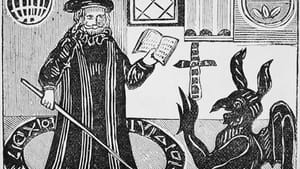Stay in the Loop
BSR publishes on a weekly schedule, with an email newsletter every Wednesday and Thursday morning. There’s no paywall, and subscribing is always free.
Better than we bargained for
Quintessence Theatre's 'Doctor Faustus'

Quintessence Theatre Group's "Devils and Saints" repertory is devilishly good, though clearly skewed to the hellish side of that duo. Devoutly religious people, especially Catholics, might feel maligned by both George Bernard Shaw's excellent Saint Joan and its smartly staged partner, Christopher Marlowe's Doctor Faustus.
Marlowe's 1593 take on the oft-used plot of a man selling his soul to the devil in exchange for earthly riches and power provides a surprising amount of humor, gleefully skewering Elizabethans' faith and fear. Doctor John Faustus (Gregory Isaac), glutted with “learning’s golden gifts,” conjures Mephistopheles (Josh Carpenter) from Hell — though the demon coyly explains that Hell is all around us.
Faust’s bargain is to “live in all voluptuousness” for 24 years and then surrender his soul, a supernatural arrangement that director Alexander Burns manifests with low-tech surprises, using an audience-splitting ramped platform and Brian Sidney Bembridge’s bold lighting. Eleven actors play multiple roles in a mix of contemporary and period costumes by Jane Casanave, and some magical elements are suggested by puppets created by Martina Plag and Curtis Coyote.
Here the ensemble, so erudite in Saint Joan, are allowed more physical, visceral performances. John Basiulis plays Lucifer as a decrepit demon in a wheelchair; Sean Close’s Pope Adrian IV is a sniveling brat; and the actors playing the Seven Deadly Sins camp it up, especially Alan Brinks’s vampish Lechery. Various demons are played by men and women in fright wigs, slinky dresses, and heels, and later become flesh-eating zombies. Marlowe’s clowns, played by Andrew Betz and Tom Carman, do a bit of amateur conjuring and are transformed by irritated Mephistopheles into a dog and cat.
At the center of it all, on stage nearly the entire play, is Isaac’s fascinating Faustus, led to ruin by his ego. Close plays his wise servant Wagner, narrating his master’s rise and fall.
Modern Hell
Burns punctuates Doctor Faustus with modern references. The more licentious aspects of demonic life are accompanied by throbbing club music (draw from that what you will — it seems apt to me, but I’m not a fan), and Marlowe’s homosexuality is referenced more literally than Elizabethans allowed. Gluttony’s beer belly and Eagles jersey get a big laugh. Faustus’s fellow Wittenberg students wear varsity letter sweaters.
Marlowe hardly needs updating, though; his nasty view of the Catholic church’s leaders, revealed when Faustus and Mephistopheles punk the Pope in his palace, requires no fresh context for anyone familiar with the Church’s recent scandals.
This fast and furious production puts a premium on spectacle — dragons, magic tricks, trapdoors belching fog and light that lead straight to Hell’s pit — but is also remarkably clear verbally and easy to follow. Marlowe knew what he was doing: like Shakespeare, he has characters become invisible just by announcing their intention. Once we think it, we see it — no CGI required.
Doctor Faustus and Saint Joan show not only the strength of repertory and of Quintessence’s growing company, but connect two plays that look critically at religion much as an increasing segment of our society does today.
What, When, Where
Doctor Faustus by Christopher Marlowe, directed by Alexander Burns. Through April 24 at Quintessence Theatre Group at the Sedgwick Theater, 7317 Germantown Avenue, Mt. Airy, Philadelphia, PA. 215-987-4450, QuintessenceTheatre.org.
Doctor Faustus runs on an irregular schedule because it plays in repertory with George Bernard Shaw's Saint Joan. The plays can be seen in one day on two Saturdays, April 9 and 16.
Sign up for our newsletter
All of the week's new articles, all in one place. Sign up for the free weekly BSR newsletters, and don't miss a conversation.

 Mark Cofta
Mark Cofta